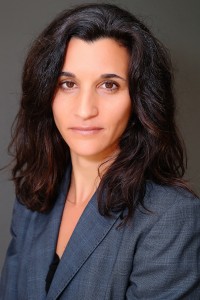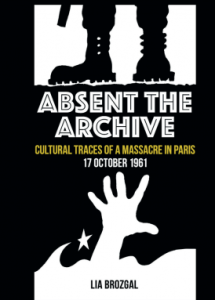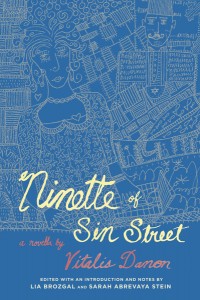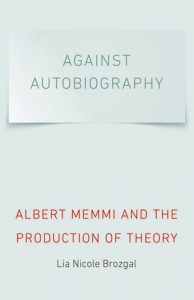Lia Brozgal earned a B.A. in French from Chatham College and a Ph.D. in Romance Languages and Literatures. Before joining the faculty at UCLA in 2008, she was an appointed lecturer in History and Literature at Harvard University. Her research and teaching encompass a variety of topics in Francophone North African literature, culture and history, as well as contemporary France. She is the author of Against Autobiography: Albert Memmi and the Production of Theory (U Nebraska Press, 2013); co-editor of Being Contemporary: French Literature, Culture and Politics Today (Liverpool UP, 2015); co-editor of Ninette of Sin Street (the first English translation of the Tunisian novella Ninette de la rue du Péché by Vitalis Danon); and author of essays on North African literature and cinema, beur cultural productions, chronicles of the Holocaust in North Africa, and Judeo-Maghrebi literature and film.
- How long have you been at UCLA? How long have you been affiliated with the Leve Center?
I arrived at UCLA in 2008 and have been affiliated with the Leve Center since the days when it was “CJS”. By my best count, that dates back to 2012.
- What drew you to be affiliated with the Center? Are there any particular projects at the Leve Center that you are a part of?
I was drawn in by the intellectual energy of the center, its particular—and unusual, I think—commitment to diversity in Jewish Studies. All of the people who make the Center “go”—staff, faculty, affiliated graduate students, members of the community—are fantastic to work with. Many of the faculty work on questions related to Jewish life in North Africa (which is also my main entry point into Jewish Studies); the programming and ongoing conversations within the Cetner reflect this.
- How did you come to be in the field of Jewish Studies? What does it mean to you as an intellectual, methodological, or professional project?
This is a tough question, as I always think of myself as “Jewish Studies-adjacent”, rather than firmly in the field. After all, my graduate training was in Romance Languages and Literature (French), not in Jewish Studies per se. But I was always drawn to what we might call “Jewish questions” in French literature; first, as an undergraduate, I wrote an honors thesis on anti-Semitism and the Goncourt brothers; later, as a graduate student, I discovered the Judeo-Tunisian author Albert Memmi (on whose work I ultimately wrote a doctoral thesis). My work on Memmi (which eventually became a book: Against Autobiography: Albert Memmi and the Production of Theory) took me deeper into the world of North African Jewry. I’ve spent the past decade exploring various facets of the Judeo-Maghrebi experience, most notably as expressed in literature and film. Participating in the field of Jewish Studies has opened my intellectual horizons significantly and really expanded my range of interlocutors.
- How have the past 18 months of remote instruction affected your teaching and research?
It does really seem that the human being can adapt to anything. The initial transition to Zoom (online teaching… online everything!) seemed unimaginable even as it was happening. I was certain that without the kinetic energy of the classroom my courses would be dull and my students would just be annoyed with me! But, like all of my colleagues, I found ways to make it work. The first quarter on Zoom was, in some ways, the best: even though we were all still just fumbling in the dark with the technology, class time felt valued and precious in ways that it hadn’t before. Many students mentioned that having “somewhere they had to be” (even if that “somewhere” was only a virtual space) really helped them to maintain a sense of normalcy and connection during the most uncertain period of the pandemic.
- How are you feeling about the return to campus this fall?
The return feels at once like a minor miracle and also less triumphant than I would have hoped. I’m teaching 1 class in person (the freshman cluster on Political Violence in the Modern World) and 1 class asynchronously (with recorded lectures). So the mix of styles is a little bit of a management challenge. Teaching in a mask, to a classroom full of masked students, is also a strange experience. Although (touch wood!) the situation seems to be improving, I think many people are still hesitant about finding themselves in congregate settings, so we don’t really have a robust sense of being “back together” and the pandemic itself is not yet firmly in the rearview mirror. I had hoped for a kind of catharsis that doesn’t seem to be possible.
- What was the last country you visited (for research or for vacation)? When were you there?
I was in France and Italy this past summer, for both research and vacation.
- If you could sit down with any figure related to your research and another UCLA scholar, student, or alum, who would fill these chairs?
What comes to mind immediately are figures only tangentially related to my own current projects, but directly related to the work of one of my advisees, Rebecca Glasberg. I’m struck by how much I’d like to have a sit down with at least one of her writers (in particular, the Algerian novelist Rachid Boudjedra). Boudjedra was a secular Muslim Algerian who wrote primarily in French, often embedding minor Jewish characters in his work. Rebecca is one of the first scholars to pay attention to this detail in Boudjedra’s corpus, and while literary interpretation need not rely on the author’s own intentions or commentary on his own work, I find myself wishing Rebecca and I could just take him out for coffee and pummel him with questions about some of his choices!
- Describe a teacher who had a profound impact on your development as a scholar.
I’ve had so many great teachers.. it would be difficult to name just one. My adviser in graduate school, Susan Suleiman, has been an important model for me. But many of the professors I had as an undergraduate—Janet Walker, Sylvie Rockmore—are very present in my mind when I think about what kind of professor, adviser, and writer I want to be…
- If you were not in academia, what type of job would you have and why?
For a long time, I thought I would follow in my father’s footsteps and become a clinical psychologist. Ultimately, I made different choices when it came to pursuing more training (after college, that is), and I think if I weren’t in academia today I’d still want to do something that involved writing. Some form of journalism, perhaps.







